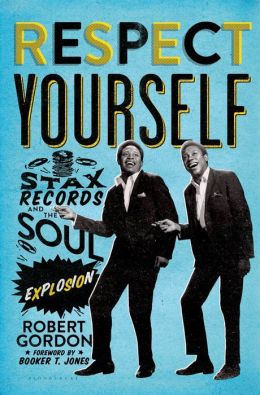 In 1961, amateur country fiddle player Jim Stewart and his sister, Estelle Axton, proprietor of Satellite Record Shop, launched a recording company in Memphis, Tenn. Jim had an ear for music; Estelle knew her customers and knew what would sell. Soon, musicians like Booker T. Jones, Steve Cropper and Donald "Duck" Dunn--the core of Booker T and the MGs--moved from hanging out at Satellite to recording for Stax, and the label eventually took off on a 15-year run feeding the musical soul of black America--a run as unlikely to be born in the center of the country as it was from the talents of two middle-class white siblings.
In 1961, amateur country fiddle player Jim Stewart and his sister, Estelle Axton, proprietor of Satellite Record Shop, launched a recording company in Memphis, Tenn. Jim had an ear for music; Estelle knew her customers and knew what would sell. Soon, musicians like Booker T. Jones, Steve Cropper and Donald "Duck" Dunn--the core of Booker T and the MGs--moved from hanging out at Satellite to recording for Stax, and the label eventually took off on a 15-year run feeding the musical soul of black America--a run as unlikely to be born in the center of the country as it was from the talents of two middle-class white siblings.
In Respect Yourself, lifelong Memphian Robert Gordon (author of the Muddy Waters biography Can't Be Satisfied) chronicles the exciting rise and ugly fall of his hometown music giant with a historian's rigor, a journalist's persistence, a filmmaker's scope and a musician's swing. When he describes the Stax sound as coming from "the thick funk of Memphis swamp," you know he's been there.
While Gordon's documentary film (also titled Respect Yourself) is full of great Stax music, the book provides much more detail about the key players and events in the label's history, along with the role of the notoriously segregated Memphis in the civil rights movement. When Martin Luther King, Jr. was assassinated in the city in 1968, Stax recording star Otis Redding had just died; soon after, when their distribution relationship with Atlantic Records ended, they lost the rights to their backlog of hit records. As Gordon puts it: "In a state of shock, Stax was a body going cold."
But Stax still had Al Bell, a former DJ who joined Estelle and Jim as a promoter and eventually became the label's vice-president. He began rebuilding the Stax catalogue, a process that accelerated after he bought out Estelle. One of the key elements of the label's rebirth was Isaac Hayes: his breakout album Hot Buttered Soul and then the soundtrack to the hit movie Shaft brought in much-needed revenue. With early Stax stars Eddie Floyd and Rufus Thomas still around, and the newly signed Staples Singers topping pop charts, Bell was able to get a new national distribution deal for Stax, this time with Columbia Records, but the business ultimately unraveled in a series of lawsuits and financial scandals.
Respect Yourself is a prototypical American bootstrap story of poverty, race, music, money and greed. But it is also a story of "shifting the paradigm, breaking the covenant, pursuing the dream... riffing, an economic jam session, a socioeconomic symphony... determined to reach the next eight bars." --Bruce Jacobs
Shelf Talker: Memphis native Gordon explores the rise and fall of the legendary Stax Records label during the turbulent civil rights movement.
 Books-A Million has closed its Laurens Road location in Greenville, S.C. WYFF News-4 reported that crews removing the building's sign said the structure was "was being renovated for a new tenant." BAM has been converting some of its low-volume bookshops into 2nd and Charles stores, and News 4 noted that "job listings for a new 2nd and Charles location in Greenville list the Laurens Road location."
Books-A Million has closed its Laurens Road location in Greenville, S.C. WYFF News-4 reported that crews removing the building's sign said the structure was "was being renovated for a new tenant." BAM has been converting some of its low-volume bookshops into 2nd and Charles stores, and News 4 noted that "job listings for a new 2nd and Charles location in Greenville list the Laurens Road location."


SHELFAWARENESS.1222.S1.BESTADSWEBINAR.gif)


SHELFAWARENESS.1222.T1.BESTADSWEBINAR.gif)
 The Barnes & Noble store located on Harbison Boulevard in Columbia, S.C.,
The Barnes & Noble store located on Harbison Boulevard in Columbia, S.C., 
 "We've had such a crazy summer," said Marlene England, who opened
"We've had such a crazy summer," said Marlene England, who opened  "We just loved the downtown," Marlene said. "And the community had been asking for a bookstore. It's a natural fit. People are coming in and saying 'thank you for doing this.'"
"We just loved the downtown," Marlene said. "And the community had been asking for a bookstore. It's a natural fit. People are coming in and saying 'thank you for doing this.'" "The idea is to open some eyes and minds to what's going on in the world around us," clarified England. "We have lots of books people have never seen before. They can come in, hear different stories."
"The idea is to open some eyes and minds to what's going on in the world around us," clarified England. "We have lots of books people have never seen before. They can come in, hear different stories." Politics took a back seat to topics like literary pillow talk as bibliophiles gathered at the state capitol in Austin last weekend for the 18th annual Texas Book Festival. Spicing things up with a session about writers' romantic exploits were Betsy Prioleau (r.), author of Swoon: Great Seducers and Why Women Love Them, and Shannon McKenna Schmidt (c.), co-author of Writers Between the Covers: The Scandalous Romantic Lives of Legendary Literary Casanovas, Coquettes, and Cads--and Shelf Awareness contributing writer--with moderator Tiffany Yates Martin.
Politics took a back seat to topics like literary pillow talk as bibliophiles gathered at the state capitol in Austin last weekend for the 18th annual Texas Book Festival. Spicing things up with a session about writers' romantic exploits were Betsy Prioleau (r.), author of Swoon: Great Seducers and Why Women Love Them, and Shannon McKenna Schmidt (c.), co-author of Writers Between the Covers: The Scandalous Romantic Lives of Legendary Literary Casanovas, Coquettes, and Cads--and Shelf Awareness contributing writer--with moderator Tiffany Yates Martin.  Congratulations to
Congratulations to  Alley Cat Books Gallery
Alley Cat Books Gallery From the Facebook page of
From the Facebook page of  I'd Rather Be Short: 100 Reasons Why It's Great to Be Small
I'd Rather Be Short: 100 Reasons Why It's Great to Be Small
 In 1961, amateur country fiddle player Jim Stewart and his sister, Estelle Axton, proprietor of Satellite Record Shop, launched a recording company in Memphis, Tenn. Jim had an ear for music; Estelle knew her customers and knew what would sell. Soon, musicians like Booker T. Jones, Steve Cropper and Donald "Duck" Dunn--the core of Booker T and the MGs--moved from hanging out at Satellite to recording for Stax, and the label eventually took off on a 15-year run feeding the musical soul of black America--a run as unlikely to be born in the center of the country as it was from the talents of two middle-class white siblings.
In 1961, amateur country fiddle player Jim Stewart and his sister, Estelle Axton, proprietor of Satellite Record Shop, launched a recording company in Memphis, Tenn. Jim had an ear for music; Estelle knew her customers and knew what would sell. Soon, musicians like Booker T. Jones, Steve Cropper and Donald "Duck" Dunn--the core of Booker T and the MGs--moved from hanging out at Satellite to recording for Stax, and the label eventually took off on a 15-year run feeding the musical soul of black America--a run as unlikely to be born in the center of the country as it was from the talents of two middle-class white siblings.